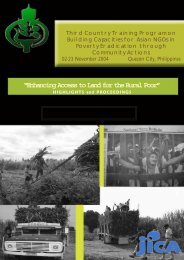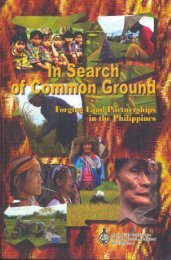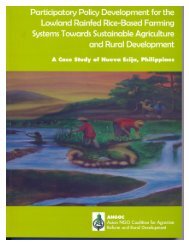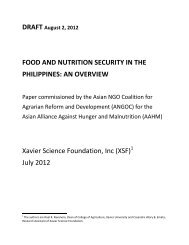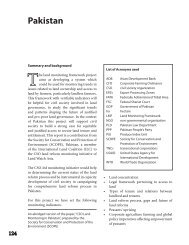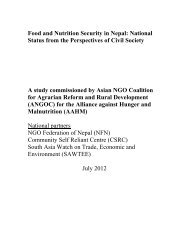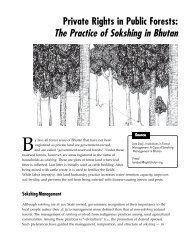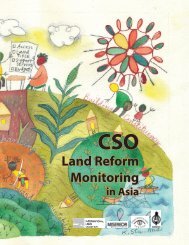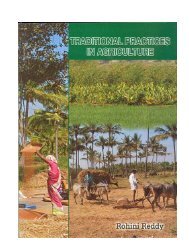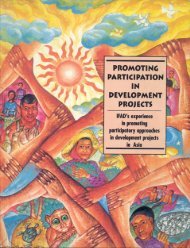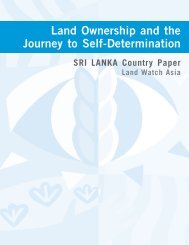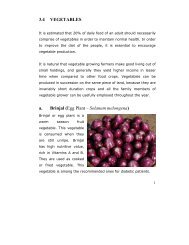Securing the Right to Land FULL - ANGOC
Securing the Right to Land FULL - ANGOC
Securing the Right to Land FULL - ANGOC
Create successful ePaper yourself
Turn your PDF publications into a flip-book with our unique Google optimized e-Paper software.
SECURING THE RIGHT TO LAND150<br />
and (3) be participa<strong>to</strong>ry in nature. Congress should ensure<br />
adequate funding for <strong>the</strong> National <strong>Land</strong> Use Act, particularly<br />
for <strong>the</strong> resolution of disputes and delineation of lands.<br />
Agrarian Reform<br />
2. National Debate on <strong>the</strong> Role of Agrarian Reform.<br />
The cessation of funding for <strong>the</strong> CARP in June 2008 has<br />
re-focused national attention on agrarian reform. This is<br />
an opportunity <strong>to</strong> launch a national debate on agrarian<br />
reform as a prerequisite for industrialization, local market<br />
development, and broad-based sustainable national development.<br />
3. Amended CARP Law<br />
The advocacy for an extension of CARP funding is likewise<br />
an opportunity <strong>to</strong> organize <strong>the</strong> critical mass of peasant<br />
groups and agrarian reform advocates (including <strong>the</strong><br />
Church and reformists in government) <strong>to</strong> lobby Congress for<br />
an amended CARP law with adequate funding and incorporating<br />
<strong>the</strong> important reforms <strong>to</strong> hasten land distribution and<br />
improve <strong>the</strong> overall implementation of agrarian reform. A<br />
proposal <strong>to</strong> this end is pending before <strong>the</strong> Lower House of<br />
Congress as House Bill 1257.<br />
Forestry<br />
4. Clear Primary Mandate of DENR.<br />
DENR, <strong>the</strong> controller-agency for public lands and natural<br />
resources, has a dual (at times, conflicting) mandate: (1) <strong>to</strong><br />
protect and conserve <strong>the</strong> environment; and (2) <strong>to</strong> promote<br />
<strong>the</strong> utilization of natural resources. This dual mandate creates<br />
confusion and conflict in <strong>the</strong> policies and operations of<br />
<strong>the</strong> department, resulting in conflicting land uses. The primary<br />
mandate of DENR should be clarified in order <strong>to</strong> resolve<br />
this confusion and conflicts.<br />
5. Co-Management.<br />
Collaborative management and strong people’s participation<br />
should be <strong>the</strong> guiding principle in forest management. This<br />
shall enable LGUs and o<strong>the</strong>r sec<strong>to</strong>rs <strong>to</strong> actively participate<br />
in forest management. This will also facilitate <strong>the</strong> infusion<br />
of additional resources and <strong>the</strong> decentralization of responsibilities<br />
and accountability such that benefits accrue <strong>to</strong> local<br />
communities.<br />
6. Forest Tenurial Instruments that are Community-Based.<br />
Community-based forest tenurial instruments should recognize<br />
<strong>the</strong> link between forest protection and a security of<br />
tenure among forest dwelling communities. They should be<br />
flexible and be based on existing community practices and<br />
traditions, integrity of ecosystems and appropriate management<br />
units.<br />
7. Mapping of Forest <strong>Land</strong>s.<br />
Estimates of Philippine forest cover are questionable because<br />
of <strong>the</strong> dearth of reliable maps and <strong>the</strong> decision of<br />
DENR <strong>to</strong> include tree plantations and orchards as part of<br />
forest lands. Mapping should be undertaken <strong>to</strong> determine<br />
<strong>the</strong> extent and location of forest areas and <strong>to</strong> document <strong>the</strong><br />
overlapping claims in <strong>the</strong>se areas.<br />
8. Environmental and Natural Resource Accounting.<br />
An environment and natural resources accounting system<br />
should be adopted in <strong>the</strong> preparation of national income<br />
accounts in order <strong>to</strong> internalize environmental costs and<br />
benefits.<br />
Indigenous Peoples<br />
9. Strict Enforcement of <strong>the</strong> IPRA.<br />
The capacities of NCIP should be streng<strong>the</strong>ned and held accountable<br />
as IPRA’s implementing agency, and funding<br />
should be assured for <strong>the</strong> implementation of Ancestral Domain<br />
Management Plans.<br />
10. Revised FPIC Procedures.<br />
The procedures of <strong>the</strong> current revised FPIC process should<br />
be reviewed and changed <strong>to</strong> conform <strong>to</strong> <strong>the</strong> traditional decision-making<br />
processes of <strong>the</strong> tribe(s) concerned. Tribal decisions<br />
based on <strong>the</strong> new FPIC process should be<br />
implemented strictly, particularly with regard <strong>to</strong> decisions<br />
involving mining and o<strong>the</strong>r extractive activities within <strong>the</strong><br />
ancestral domain.<br />
11. Established Conflict Resolution Mechanisms.<br />
The competing claims of IPs and o<strong>the</strong>r basic sec<strong>to</strong>rs on <strong>the</strong><br />
same land have resulted in an extremely polarized situation<br />
that is difficult <strong>to</strong> resolve. The IPRA should serve as <strong>the</strong> legal<br />
framework for <strong>the</strong> resolution of <strong>the</strong>se competing claims and<br />
<strong>the</strong> Ancestral Domain Management Plan adopted as <strong>the</strong><br />
overall development framework <strong>to</strong> which <strong>the</strong> plans of o<strong>the</strong>r<br />
stakeholders can be incorporated. A cadre of facilita<strong>to</strong>rs<br />
should also be formed <strong>to</strong> ensure <strong>the</strong> peaceful resolution of<br />
<strong>the</strong>se claims at <strong>the</strong> local level.<br />
12. Sustained Information Dissemination.<br />
There should be continuing Information, Education and<br />
Communication (IEC) on <strong>the</strong> IPRA, as many are still unaware<br />
of <strong>the</strong> law’s specific provisions. The IEC campaign<br />
should also aim at building broad support for <strong>the</strong> implementation<br />
of <strong>the</strong> IPRA.



